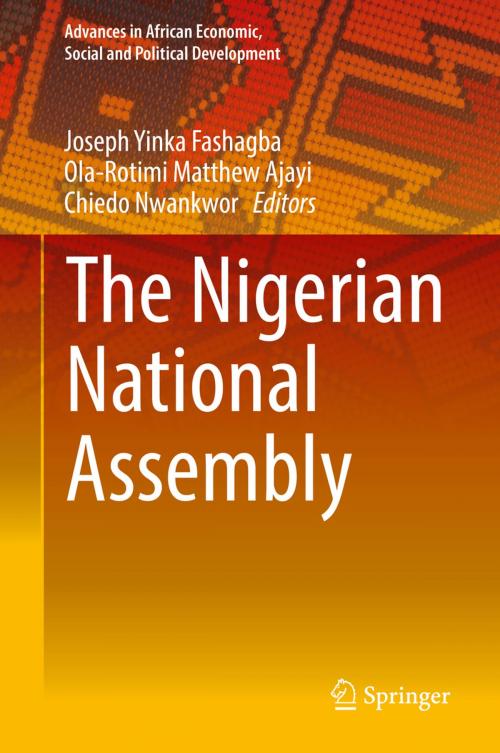The Nigerian National Assembly
Nonfiction, Social & Cultural Studies, Political Science, Government, Democracy, International| Author: | ISBN: | 9783030119058 | |
| Publisher: | Springer International Publishing | Publication: | April 11, 2019 |
| Imprint: | Springer | Language: | English |
| Author: | |
| ISBN: | 9783030119058 |
| Publisher: | Springer International Publishing |
| Publication: | April 11, 2019 |
| Imprint: | Springer |
| Language: | English |
This book examines the role of the legislature in the democratic governance of Nigeria. Once one of the foremost political institutions of governance established in the early days of Colonial administration in Nigeria, the legislature has had an inconsistent role since statehood, subject to repeat dissolution at the hands of various military regimes. Focusing on the Nigerian Fourth Republic’s National Assembly (1999-present), this book discusses in detail the ways in which the national assembly has handled each of its major functions, the nature of the relationship between the assembly and the legislature, and the institutional mechanism through which its internal business is facilitated and executed. Furthermore, the chapters examine the level of assertiveness of the legislature, and the degree of importance and weight attached to their contributions to governance in motions, resolutions, and law-making. This book offers a unique look into legislative studies, an area which has been historically overlooked in the research on the Nigerian government, and will be useful to students and researchers in African studies, democracy and state-building and legislative studies.
This book examines the role of the legislature in the democratic governance of Nigeria. Once one of the foremost political institutions of governance established in the early days of Colonial administration in Nigeria, the legislature has had an inconsistent role since statehood, subject to repeat dissolution at the hands of various military regimes. Focusing on the Nigerian Fourth Republic’s National Assembly (1999-present), this book discusses in detail the ways in which the national assembly has handled each of its major functions, the nature of the relationship between the assembly and the legislature, and the institutional mechanism through which its internal business is facilitated and executed. Furthermore, the chapters examine the level of assertiveness of the legislature, and the degree of importance and weight attached to their contributions to governance in motions, resolutions, and law-making. This book offers a unique look into legislative studies, an area which has been historically overlooked in the research on the Nigerian government, and will be useful to students and researchers in African studies, democracy and state-building and legislative studies.















